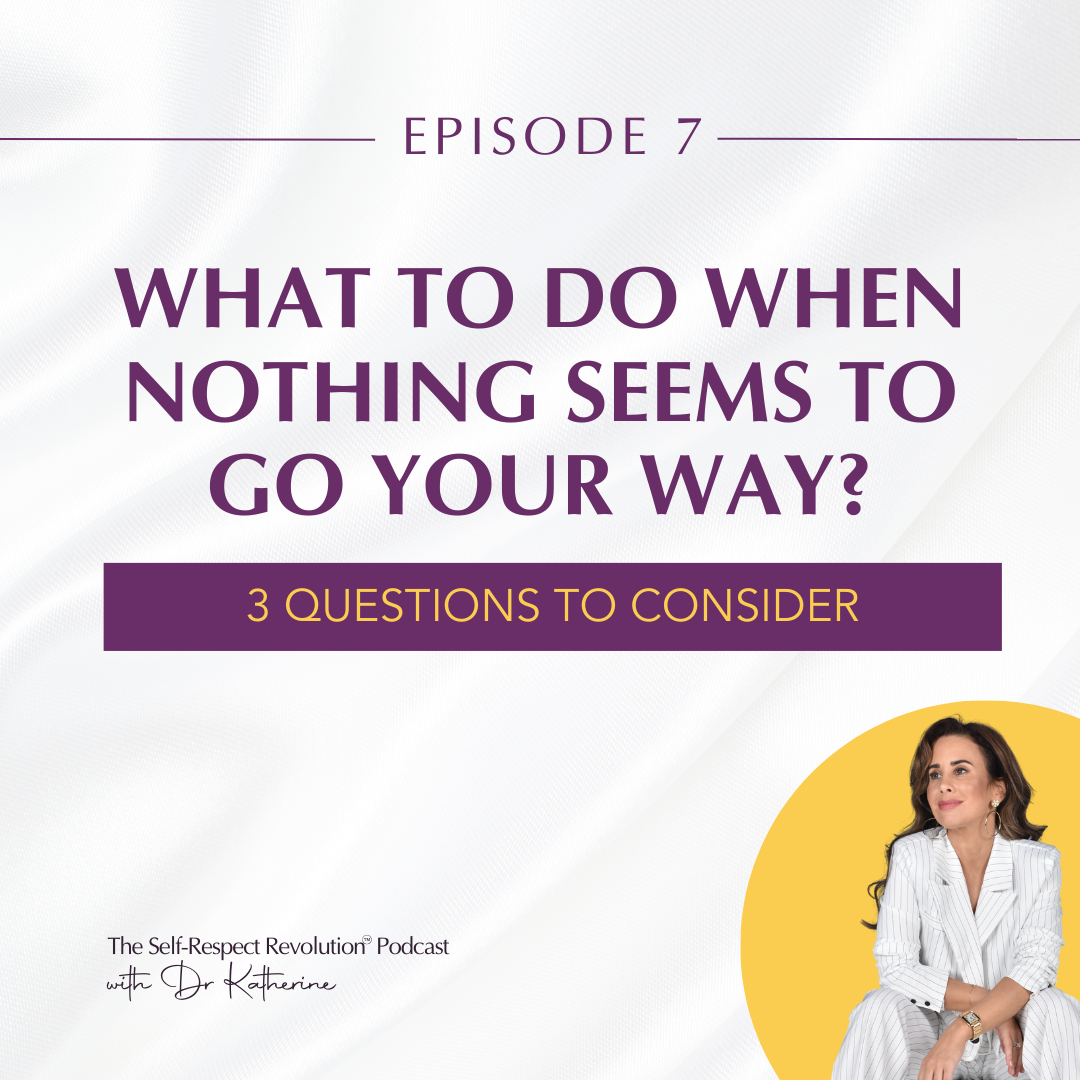
S1 EP7 – What to do when nothing seems to go your way? 3 questions to consider.
When nothing seems to go your way, here’s 3 questions to get back on the journey to happiness.
S1 EP5 - S1 EP5 – Are you *really* being criticised? Turning hurt into happiness.
Hello, fabulous listeners! In this episode, we dive deep into the nuanced relationship between self-respect, authenticity, and the criticism we face in our daily lives. I share personal anecdotes and insights that I hope will resonate with many of you.
Three Reasons Why You Should Tune In:
Plus, I share a fun fact about my childhood that might just surprise you! So, if you’re a woman striving for success while juggling the expectations and criticisms of the modern world, this episode is designed especially for you. Let’s embark on this journey of self-discovery and self-respect together.
Stay fabulous,
Dr Katherine xoxo
[00:00:00] Hello, and welcome to another episode of the Self Respect Revolution Podcast, where we explore how self respect shapes who we are, the decisions we make, and the lives we live as leaders, best friends, parents, mentors, and entrepreneurs. My name is Dr. Katherine Iscoe, and I’m so glad you’re here because today we are going to be discussing a topic that everyone deals with and no one is good with, which is criticism.
[00:00:28] On the last, last podcast, we explored burnout, specifically that the experience that I believe people go through, or at least I went through during burnout, which I called the burnout trinity, and there’s three things that really happen. Number one, it’s a swear word, but I’m going to say feek. Second one is fear.
[00:00:46] Third one is the facade. The mask that we wear to say, Nah, we’re good because everyone else has it worse off than us, so I’m just going to smile, because my problems are really not problems at all. And I really want [00:01:00] to dive into this concept of the facade. Wearing a mask. You know, what does it actually really mean?
[00:01:07] And I actually looked it up. And here I’m going to read out the exact definition, which is a deceptive outward appearance. But here’s what really threw me for a loop. You know how on definitions there’s always an example, like using the word in a sentence as an example? Here was the example. Her flawless public facade masked private despair.
[00:01:36] I’m like, other than the flawless part, I’m like, hmm, are they talking about me? Is my picture in there? Because that’s really what I think wearing a facade is. You’re masking something that you’re either aware you’re going through, Or you’re not actually aware that you’re going through and you’re just unconsciously exuding something that you think other people expect you to exude.[00:02:00]
[00:02:01] So today I want to take that concept of the facade and dive into three specific aspects of it. Number one, we’re going to be talking about the difference between being true to oneself and being authentic to oneself. Number two, we’re going to look at how being true to yourself is related to criticism.
[00:02:22] And number three, we’re going to look at an aspect of criticism that I think no one else has ever considered. And I think unless we’re aware of this aspect, We’re going to become even more paralyzed by criticism because the only person that I’ve ever met that has not been affected by criticism is my partner because he just walks into Anywhere anywhere in the world and he just thinks I’m awesome and everyone’s gonna think I’m awesome I’m not quite there yet.
[00:02:55] hashtag sorry hashtag Canadian. So [00:03:00] let’s dive in So if you didn’t listen to the last podcast, I’m going to give you a whistle stop tour of what happened. Went to a psychologist. She said I was burnt out. I said, you have no idea what you’re talking about. And we, I had bargained that I was going to take the rest of the afternoon off.
[00:03:15] Within about an hour, I was like, holy crap, I’m burnt out. And I was thinking I’m going to have the Google experience, like the Dr. Google experience, which is I’m tired. You know, I feel lethargic. I feel like nothing. I feel apathetic. I was like, Ooh, I did not experience that at all because I felt a whole range of emotions, which was that, uh, burnout trinity, which was the.
[00:03:44] I felt everything under the, under the sun. So of course, I turned to my guiding light, which is my father. Uh, if you would have heard some of these other episodes, you would know that he is literally my Dr. Phil. He’s Dr. Isco. I’m Dr. Isco [00:04:00] as well, just putting it out there. And you know, I was talking about what’s going on and so forth, and he just said, you know, Kathy, to thine own self be true.
[00:04:08] I’m like, oh, here we go again. He had been telling me that for years and years and years. And even at that point, I was like, I don’t get it. And I said to him, like, Dad, I am being true. Look at me. I couldn’t be as authentic, as authentic as I’ll ever be. To thine own self be true. I’m like, okay, okay. Then a couple days later, here’s what happened.
[00:04:34] I was, somehow fell down the Google rabbit hole, and I saw an article, or pardon me, I read an article about Will Ferrell. And, you know, the famous comedian, he’s done like stepbrothers, he does anchorman and so forth, but specifically about how he got his start and how he got a start was on a show called Saturday night live.
[00:04:54] And this is a very, very well known show in North America and really is the [00:05:00] springboard for any comedian to get their global leverage. So when he was doing this audition, you know, you go in, you do an audition and it’s filmed. Will Ferrell. Pretended to be a cat. And yes. You don’t need to rewind. I said a cat, but more specifically he was a white collar worker who messaged his secretary and said, oh hold all my calls and then he pretended to be a cat like and it’s so Incredibly impossible for me to actually describe what this film or this video looks like so I encourage you To Google and somehow find it.
[00:05:41] It’s a bit hard to find but just Google Will Ferrell audition Saturday night live cat And there I was thinking, okay, Will Ferrell, arguably one of the most successful comedians in history with the most prolific career imaginable. [00:06:00] God is starred by being a cat. You could not be any more true to yourself than nearly embarrassing yourself but actually sparking an incredible career.
[00:06:13] By just being yourself. And there I was, thinking, I can’t even friggin make anything work. I was like, I said to my dad, I’m like, I should be farther ahead. I should be more successful by now. And, if you would have listened to the last episode, I talked about self care. And this perception that it’s like hot baths and spas and so forth.
[00:06:37] From my research study, what I found is that self respect adds another layer to self care. And it’s this. Self care, when it comes to self respect, is asking yourself a question, a seemingly simple question, which is actually a very difficult answer, which is, what is it that I need right now to feel more like myself?
[00:06:59] And what I [00:07:00] realized is that I was avoiding the answer I knew, which is, up until that point, I had really designed and orchestrated my life and all the choices that I made to specifically avoid criticism versus being true to myself and prioritizing my happiness. No wonder why I was trying to avoid really.
[00:07:26] I guess acknowledging, or I would even say like pulling that answer out of the ground. Because the evidence was there, you know, how I spoke, how I chose to talk, what I talked about, everything. And this is when my study really opened up my eyes, specifically how, just how powerful self respect can actually be.
[00:07:47] Because I always thought that it had to do with confidence. Like the reason why I was so affected by criticism was because I just needed to be more confident, even though I was a quote unquote confidence expert. I was like, [00:08:00] maybe there’s just like another level. And once I’m really, truly like guru level.
[00:08:05] Confidence. Maybe then I’ll be immune to the effects of criticism. But here’s the thing that blew my mind when it came to the data that came out of the study, which was people with healthy levels of self respect are able to make choices that are aligned with their happiness. So yes, they’re not trying to make other people unhappy, but they realize the importance and the impact that making choices aligned with who they are
[00:08:40] And to emphasize this, I’ve extracted a few quotes from those interviews and I’d love to share them with you because this really underscores and underlines how incredibly powerful this correlation is. The first quote is, self respect is that I make my own choices and I stand by my choices. [00:09:00] Number two, you can do you as opposed to pleasing other people.
[00:09:05] Number three. Self respect allows you to say the choices and the decisions I make are mine and mine only. They may be the wrong decisions, but right now, this is what I believe I need. And all decide for myself. So the first thing here to recognize is the difference between being true to oneself and being authentic to oneself.
[00:09:27] And of course I went to the guru herself, Dr. Brene Brown, who’s the leader in shame and vulnerability, but also authenticity. And her definition is and I quote, Authenticity is a daily practice of letting go of who we think we’re supposed to be and embracing who we actually are. So the difference between authenticity, which is that this daily practice of letting go so you can accept who you actually are is much different than being true to yourself, which is specifically [00:10:00] about making choices that align with your happiness.
[00:10:02] And I think that’s really important and something that perhaps you can even just chew on right now. It’s when’s the last time you made a choice that aligns with your own happiness versus saying, maybe I shouldn’t think, you know, about their happiness. Number two, how being true to yourself is related to criticism.
[00:10:22] Well, let me ask you this. Thinking back to that, that, uh, memory when you made a choice based on your own happiness, you made that choice, and you were happy, truly happy. In that moment, were you worried about criticism? And I really think that’s why, when we respect ourselves enough to prioritize our own happiness through choices, we actually experience that happiness.
[00:10:46] And again, I’ll emphasize, not just happy, truly happy, big difference there. When we can get to that place where we’re empowered by our own choices, and therefore we have cultivated our own [00:11:00] happiness, I think we become more and more immune to other people’s criticism. But I think there’s another aspect of criticism, and this is the third point for today’s podcast.
[00:11:13] So I’ve had a very good run on social media where I think I’ve received one not so nice email where the women said something along the lines of go back to Canada you anorexic piece of shit. That was years ago but until recently I’ve been like smooth sailing, right? Smooth sailing. No problems whatsoever.
[00:11:35] I’m sure other people might think something but they don’t comment right. So about a week and a half ago I did a post about Something that happened in my life 20 years ago, I’ve never spoken about it because I’ve always just put myself as the only person to blame. And what happened was, this is a truncated story, I fell in love with a prof, he was in a position of power, I didn’t really think about that.
[00:11:59] We had, [00:12:00] it wasn’t even an affair, it was a mental affair, I guess you would call it a geek affair. You know, nothing physically really happened. But it was wrong. It was absolutely wrong, but I thought it was all my fault up until, you know, I think it was like last year. I watched this documentary. It was about the victims of Jeffrey Epstein and Ghislaine Maxwell.
[00:12:19] And what happened was I was listening to a psychologist on that documentary and again, I truncate and paraphrase here, but basically she was saying is just because you’re an adult doesn’t make you immune to the influence of a person in power. I thought, oh. So maybe it wasn’t a hundred percent my fault because up until then I just thought I’m a stage 5 clinger I was desperate for attention and there I was Being selected in my mind by someone who is revered because if you’ve never been in a university class being taught by a very confident and very knowledgeable [00:13:00] professor.
[00:13:00] It’s really hard to wrap your head around, like, why a prof would be in a position of power and be so alluring. And I get it. If you don’t understand, I get it. Because from the outside in, you’re like, A prof? Aren’t they just a teacher? What’s the big deal? But in a class of 1, 200, where you could hear a pin drop when the professor was speaking because he was just so Intelligent.
[00:13:25] It’s hard not to be enthralled and transfixed by them. And that’s why there is both implicit and explicit rules within at least decent universities that say students are always and absolutely off bounds for profs. There’s no question about this. And this even extends into So this is how important it is because universities know that the power of a prof or a student is unyielding.
[00:13:57] But this didn’t ever occur to [00:14:00] me because I just figured it was my decision. I take full responsibility for it because I knew what I was going in, eyes wide open, right? So, Up until this point, I was like, it’s 100 percent my fault. Not even 99. 9%. It was 100 percent my fault. So I posted this story. It was misinterpreted by a very small percentage.
[00:14:20] I mean, the level of support literally blew my mind. But let’s say, let’s say 3%, you know, were not as, uh, they were very direct in their opinion of that. And that actually, for the first time, I was really surprised and proud of myself as. The criticism actually didn’t affect me, and the reason is, is because I was so proud of why I posted that story, which was not to say that I was a victim, which was not to allude me of any blame.
[00:14:54] I am the first one to say that I was just as responsible as him. The [00:15:00] post was not about that. The post was not about glorifying, having an affair. Nothing about that was trying to get myself out of, like, a scapegoat situation. The point of it was trying to say, for those people who, for example, work in big corporates, and they feel like they are transfixed by a person in power, and then they regret their decisions afterwards, I’m here to say, you know what, I get it.
[00:15:27] I get it and yes, you know what, you’re an adult and maybe you could have made a better decision, but there’s a section of it that you need to understand, which is when a person in power says, Hey you, you’re special. There’s something that happens in the brain and it makes you do things that you normally would not do.
[00:15:47] It’s like a drug. So I got comments like, oh look at her. She’s playing the victim and oh, she, you know, it was your fault. Why are you trying to, you know, say it was his fault and you know, oh another basically me [00:16:00] too thing. I was like, this is nothing to do with gender. This has nothing to do with gender because it could have been a It’s like a female prof going after, you know, a male student and a male student, you know, saying yes to the, um, the love of a prof and nothing to do with that.
[00:16:15] And that’s a different aspect of criticism that I’ve never ever considered. Which is, not really about criticism, but the disappointment when a message that is so important to you, And maybe you can relate to this. You know, the last time that you had an argument with, or even you brought up something important with someone you love, and you said something, and then they say, well, why are you saying that?
[00:16:46] And you’re like, no, no, no, no, no. That’s not what I meant. And it gets, you know, almost like that, like, you’re twisting my words. And I thought, I think the reason why I’m saying this is because criticism [00:17:00] never feels good. And I was taking this, putting this in the bucket of, okay, that’s criticism. But when I took a step back and I said, okay, how can I look at this differently through a lens of self respect?
[00:17:12] Okay, self respect is knowing that you’re important. Self respect is knowing that I can prioritize my own happiness, that I can make the choice of sharing the story because it’s true to me. I’m like, okay, how do I think about this? And what, what I found was that it wasn’t actually criticism. I was just disappointed that my message didn’t get out.
[00:17:37] in the way that I wanted to. I was like, ah, that’s really interesting. That’s really interesting because how many times have you, for example, your boss has come in and said, oh, I have some constructive feedback for you. What do people hear? Ah, we’re shit. You’re going to tell us how shit you are. Like we misinterpret criticism.
[00:17:58] All the time, [00:18:00] and I think this was one of those situations where like, I’m so glad I took the time to really think about what is actually happening here, and it’s just because I put something very heartfelt out there for the sole reason is, is I hope this just helps one person just feel less crazy in their head, and it was misinterpreted.
[00:18:22] I’ve read this quote online, and I think it’s really apropos to what we’re talking about, which is, Criticism is the disapproval of people, not for having fault, but having fault different from your own. At the end of the day, even when you look at criticism, is it really criticism? Or are we just misinterpreting what each other are saying?
[00:18:43] So to summarize, there’s three, I guess, take home lessons that I would love for you to consider, which is one… Being true to yourself is different than being authentic. They’re related. Sure. Absolutely authentic as Brene Brand said is, you know Just letting go of who you think you should be [00:19:00]embracing who you actually are.
[00:19:01] Whereas being true to yourself Is saying you know what? This is me and these are the choices that I think are going to help me get one step closer towards real happiness, not just happiness, true happiness. So What is one choice that perhaps in the next 24 to 48 hours to next week that you can say, you know what, this is going to be hard because I might disappoint people, but I know this choice is really going to, uh, yes, what’s the word?
[00:19:30] Prioritize. Thank you, my happiness. I don’t know who I said thank you to there. There’s no one here. My imaginary friend. That’s about it. Number two. When we prioritize our own happiness through those choices, and we feel this true happiness, that’s going to increase our chances of being more immune to criticism.
[00:19:47] Why? Again, happiness and being affected by criticism, they’re mutually exclusive. I think Brene Brand uses the same sort of thing about shame and secrecy. If you put [00:20:00] two of those, shame and secrecy, in a petri dish, they just like, all the bugs sort of grow. But if you put shame, And sharing those secrets, all of a sudden shame shrinks.
[00:20:11] And number three, what I’d like you to do is consider criticism by taking a step back, looking at it through a lens of self respect, which is, I know I’m important. And see what you come up with. You know, the last time you were either consciously or unconsciously criticized by someone else, whether you were actually criticized or whether you just perceived.
[00:20:34] that criticism. Can you look at it through, okay, is it criticism or is what I have done or what I’ve said just being misinterpreted by the other person? Hope this has been helpful. I would love to hear your perception of what criticism means to you and have you ever considered that criticism isn’t actually criticism, it’s actually just someone has [00:21:00] misinterpreted What you’ve said or did feels like criticism.
[00:21:04] Thank you again for listening to this. Today was a bit short and sharp, but I always say that. But then it just keeps on going and going. A little fun fact to end. I actually didn’t speak, I think, until I was a half and my parents put me into speech therapy. And now they say, God, the woman just won’t shut up.
[00:21:22] Fun fact. Why these short podcasts always end up a bit longer than expected. Anyways, thank you again for listening. My name is Dr. Katherine Iscoe, and until next time, stay fabulous.

When nothing seems to go your way, here’s 3 questions to get back on the journey to happiness.
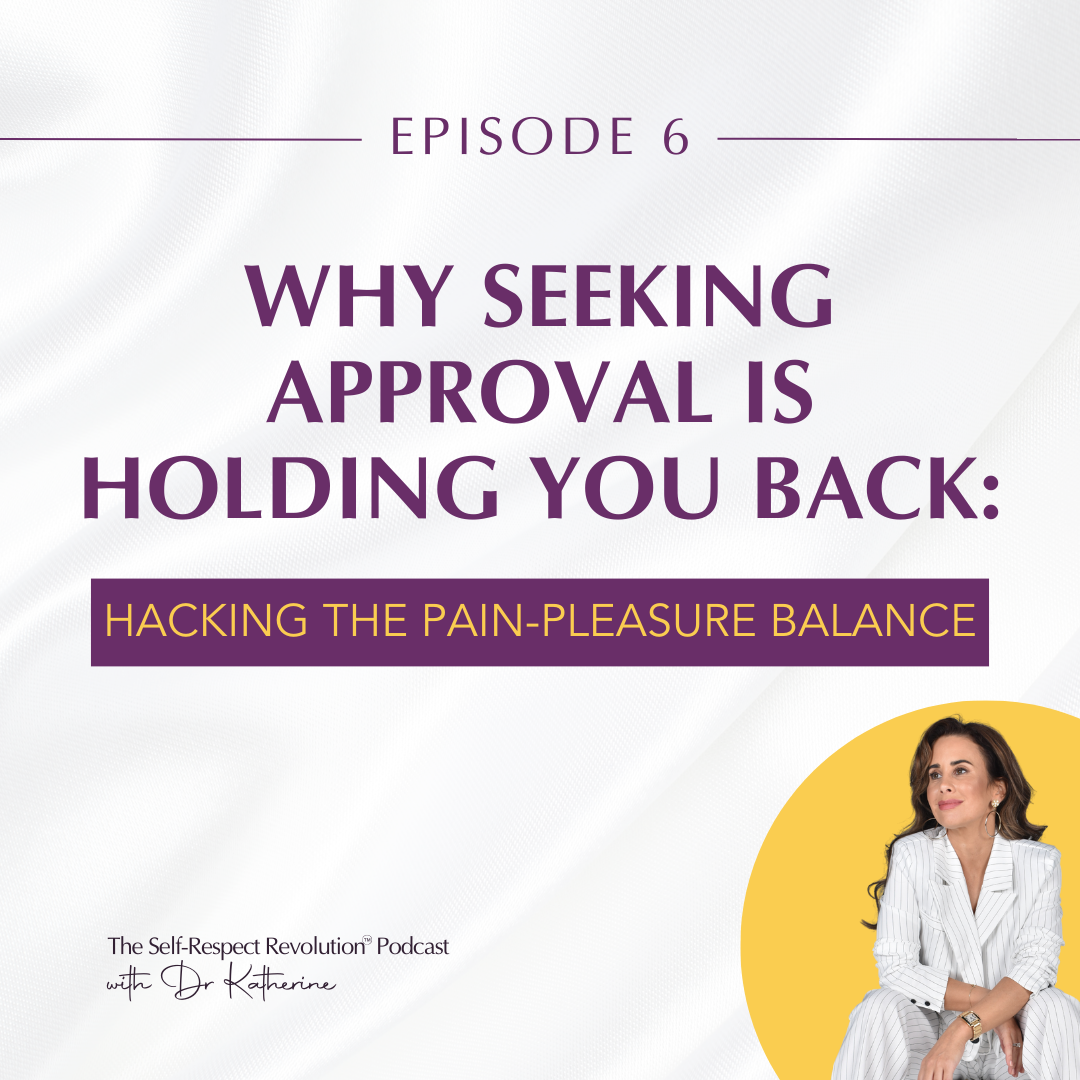
Waiting for a sign to start your life? Here’s why seeking approval is holding you back.
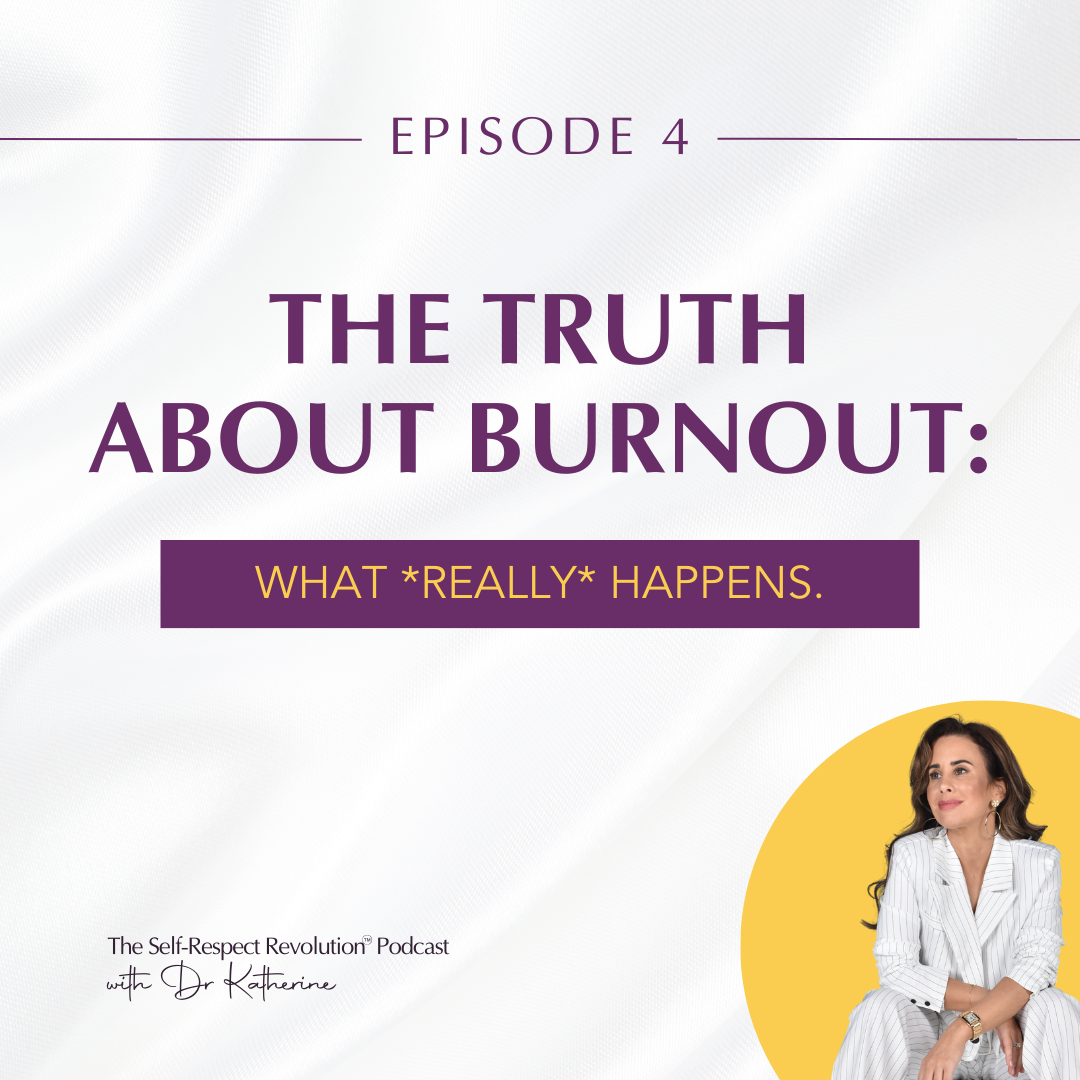
If you’ve ever felt like everyone else handles burnout better than you, this episode is for you.
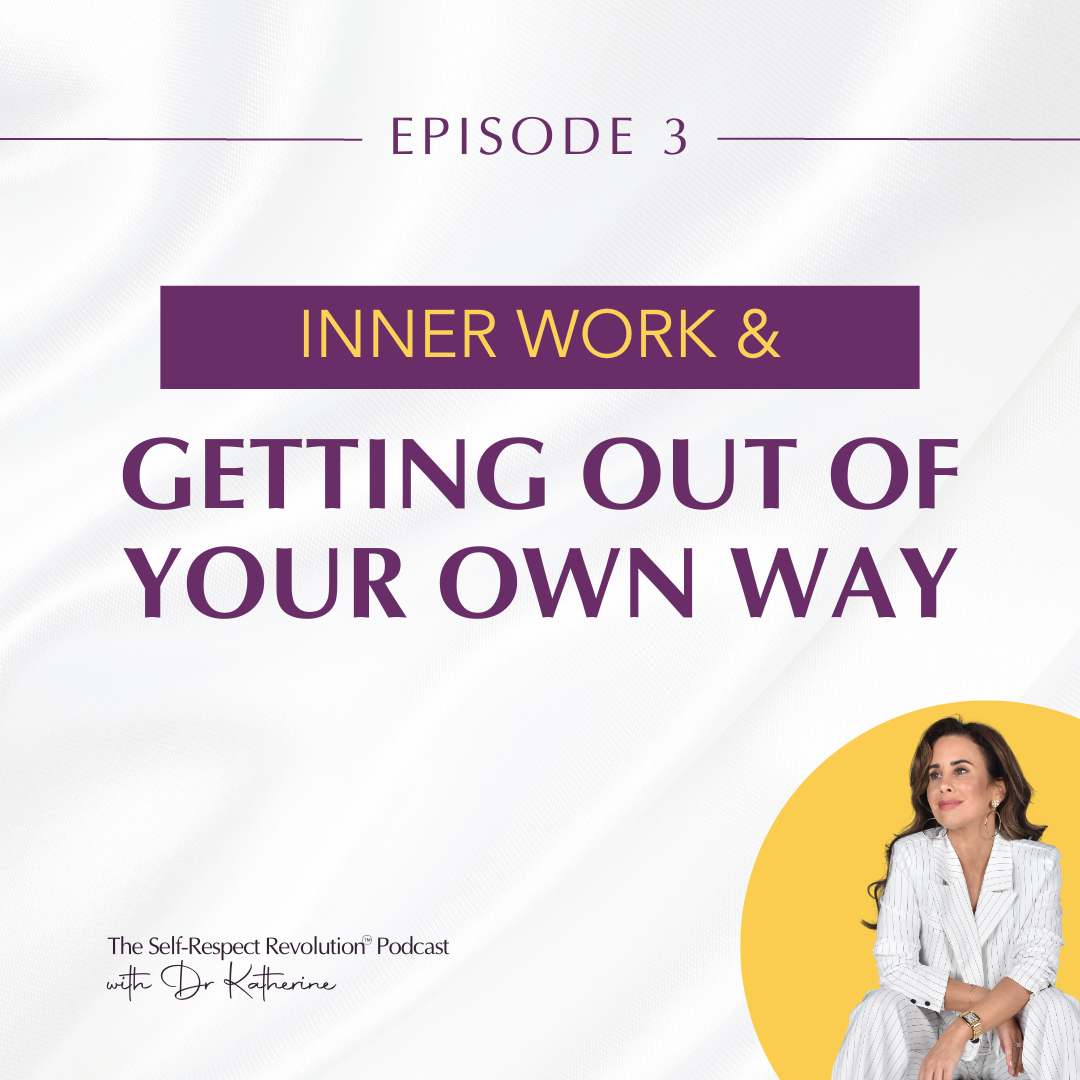
If you’ve ever felt the weight of the world’s expectations, or felt like you’re wearing a mask, this episode is for you.
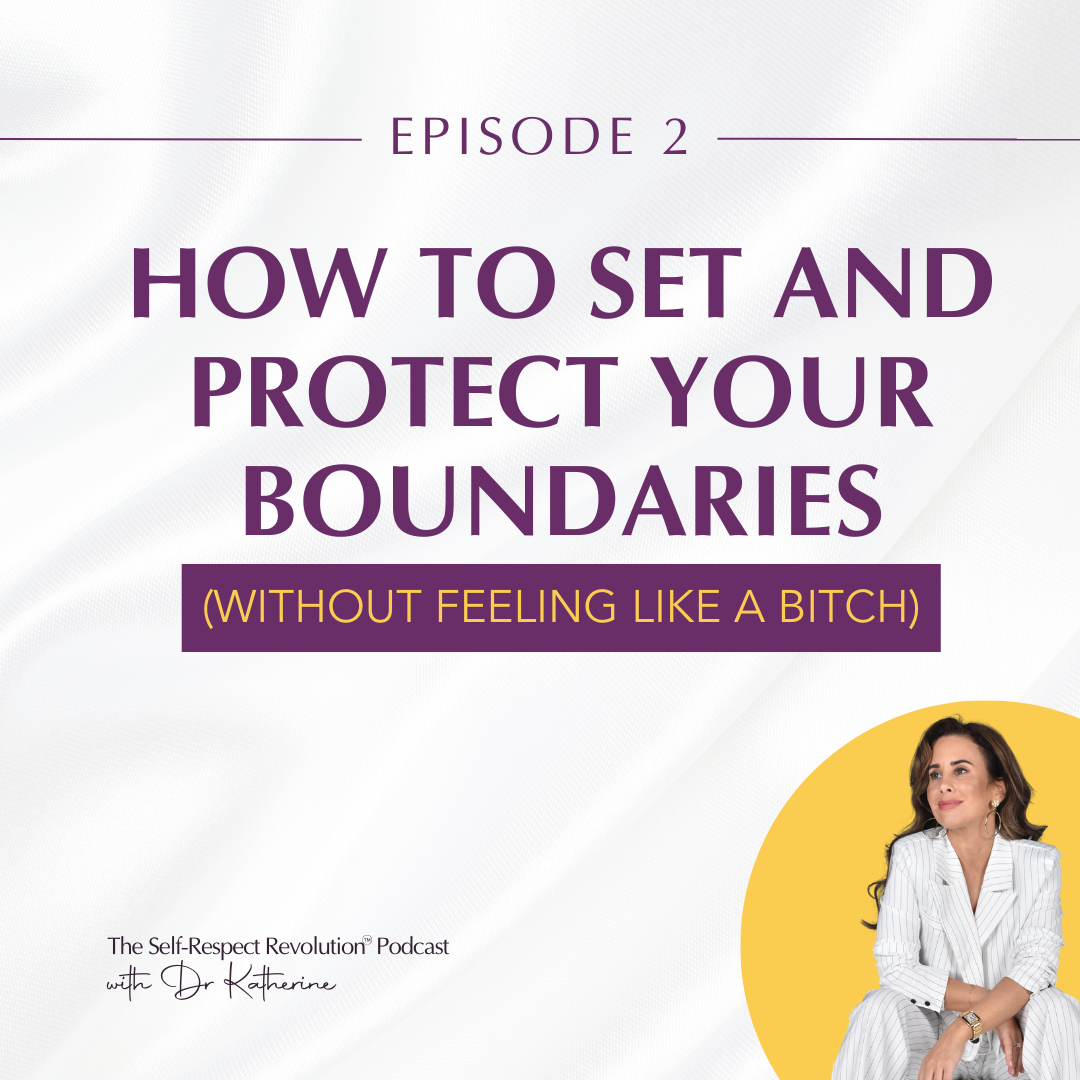
Learn how to set and protect your boundaries with confidence, clarity (and without feeling like a b!tch)
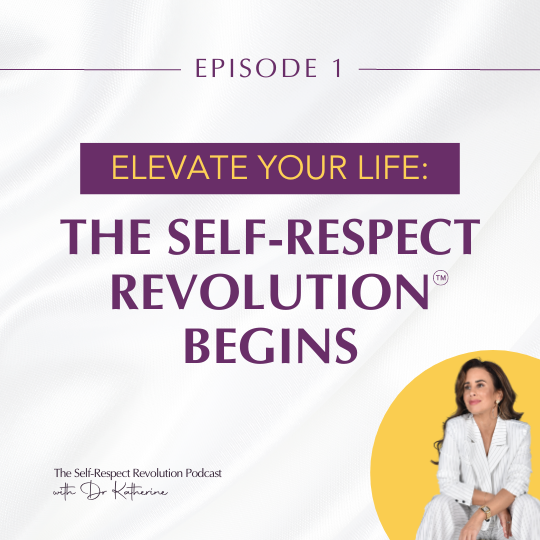
Discover how to elevate your life with the untapped benefits of self-respect and transform the way you live, love and lead.